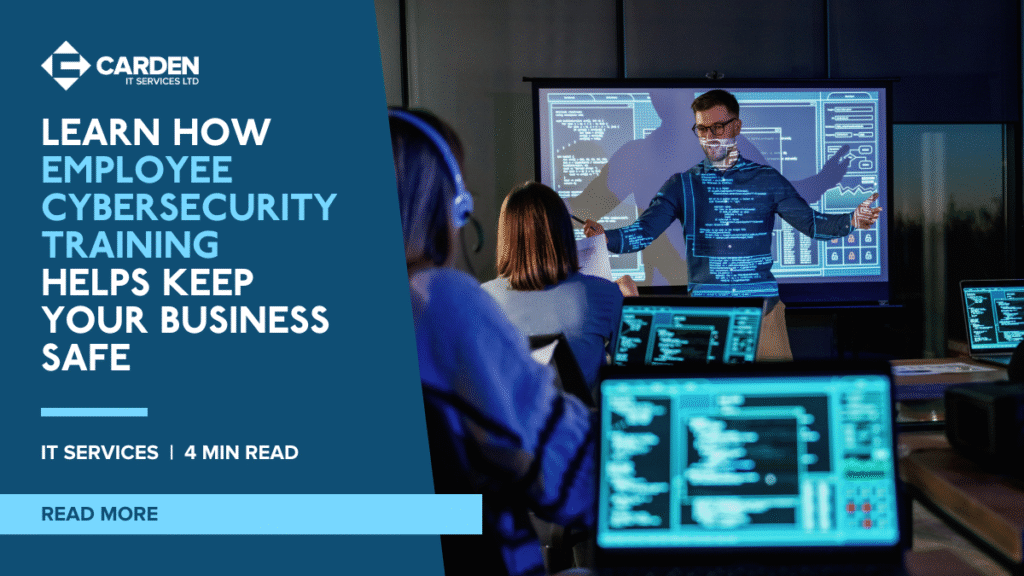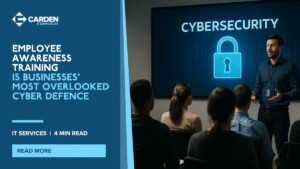- Why Employees Are Key to Cybersecurity
- The Risks of Not Providing Cybersecurity Training
- What Effective Cybersecurity Training Should Cover
- Removing the Stigma Around Cybersecurity Breaches
- How Often Should Training Be Delivered?
- Making Training Engaging and Practical
- How Carden IT Services Can Help
- Final Thoughts
Strong cybersecurity measures are no longer just an IT concern, they’re a business necessity. And while firewalls and antivirus software play an important role, one of the most powerful tools in your defence strategy is something far more human: your team.
At Carden IT Services, we know that employees can be your strongest line of defence, or your weakest link, depending on the training and awareness they’ve received. Let’s explore why employee training is so vital to cybersecurity and how you can strengthen your organisation from the inside out.
Why Employees Are Key to Cybersecurity
Cybercriminals are becoming increasingly clever, but many of their tactics still rely on a simple element: human error.
Whether it’s clicking on a suspicious link in a phishing email, using a weak password, or unknowingly sharing sensitive information, everyday actions can open the door to serious threats. According to numerous studies, a large percentage of security breaches can be traced back to staff mistakes rather than system failures.
That’s why well-informed employees aren’t just helpful, they’re essential. When your team knows how to recognise and respond to threats, they become an active part of your cybersecurity strategy.
The Risks of Not Providing Cybersecurity Training
Failing to train your staff can leave your business vulnerable to a wide range of problems:
- Financial Loss: A single successful cyberattack can lead to significant costs, from ransomware payments to lost revenue during downtime.
- Data Breaches: Sensitive customer or company data could be exposed, potentially leading to hefty fines under data protection laws.
- Reputational Damage: Trust takes years to build, and seconds to lose. Clients may think twice about working with a company that’s suffered a breach.
Without regular training, even the most well-meaning employees can make costly mistakes.
What Effective Cybersecurity Training Should Cover
Cybersecurity training doesn’t need to be complicated or overwhelming. The most effective programmes cover the basics clearly and consistently. Here’s what your team should know:
- How to spot phishing emails and suspicious links
Teach them the red flags: unexpected attachments, urgent requests, odd sender addresses, and misspellings. - Creating and managing strong passwords
Emphasise the importance of unique, complex passwords and encourage the use of password managers. - Multi-Factor Authentication (MFA)
Explain why it’s a simple but powerful layer of protection. - Safe browsing and data handling
Cover best practices when working online, especially when accessing systems remotely or using cloud platforms. - How and when to report suspicious activity
Ensure everyone knows the correct process for raising the alarm quickly if something seems off.
Removing the Stigma Around Cybersecurity Breaches
One of the biggest barriers to a secure workplace is fear, fear of punishment, embarrassment, or blame. When employees are afraid to report potential cybersecurity incidents, small issues can escalate into major breaches.
Fostering a culture of openness is essential. Staff should feel safe and supported in reporting mistakes or suspicious activity. This helps:
- Encourage early reporting, which can dramatically reduce the impact of a threat.
- Create a learning-focused environment where employees grow from incidents rather than hide them.
- Build trust across your organisation, making everyone feel like a valued part of the defence strategy.
At Carden IT Services, we advocate for a blame-free culture that prioritises education, support, and shared responsibility. Because the sooner issues are reported, the faster they can be resolved, and the more secure your business becomes.
How Often Should Training Be Delivered?
Cybersecurity threats are constantly evolving, which means training shouldn’t be a one-off event.
- New starters should receive basic training as part of their onboarding.
- All staff should take part in regular refresher sessions, ideally quarterly or bi-annually.
- Ad hoc training should be provided when new tools are introduced, or emerging threats are identified.
By keeping knowledge up to date, you reduce the risk of gaps in your defences.
Making Training Engaging and Practical
Let’s face it, nobody likes a dull slideshow full of technical terms. To make training stick, it needs to be relatable and relevant.
- Use interactive formats like workshops or real-time quizzes.
- Run simulated phishing tests to give staff hands-on experience.
- Incorporate real-life examples that your team can connect with.
- Focus on a positive approach, empower your staff rather than scare them.
People learn best when they feel involved and supported, not judged.
How Carden IT Services Can Help
At Carden IT Services, we don’t just provide cybersecurity solutions, we provide peace of mind.
We offer tailored cybersecurity training sessions designed to suit your business and your team’s knowledge level. Whether you need help building awareness, implementing new protocols, or testing your defences, we’re here to help.
Our managed IT services also include ongoing support, regular security audits, and real-time threat monitoring, so your business is protected from every angle.
Final Thoughts
Cybersecurity is everyone’s responsibility, not just the IT department’s. When your team is trained, informed, and confident, they become a powerful defence against today’s cyber threats.
If you’d like to discuss how Carden IT Services can help improve your staff training and overall security posture, get in touch today. We’re ready to work alongside you to build a safer, more secure future for your business.




